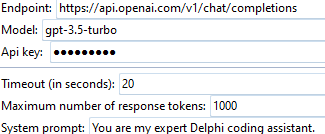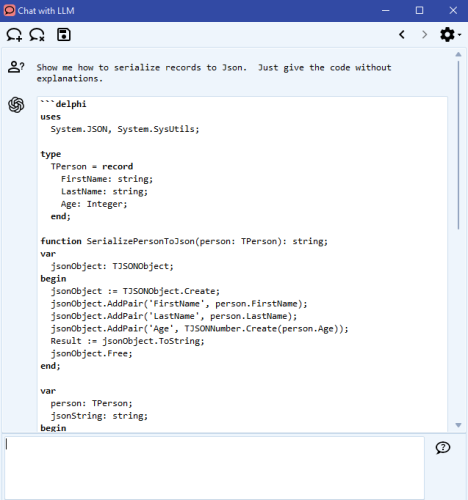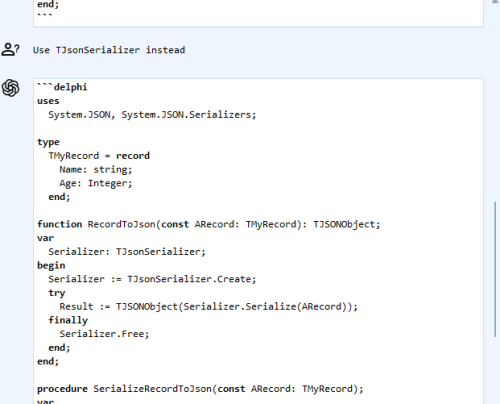-
Content Count
1020 -
Joined
-
Last visited
-
Days Won
66
Posts posted by pyscripter
-
-
2 hours ago, Uwe Raabe said:Probably related: https://quality.embarcadero.com/browse/RSP-43125
It is almost a show stopper for laptop screens. I wonder why it has not attracted more votes and the attention of Embarcadero.
-
1 hour ago, baoquan.zuo said:Known issue?
Not sure. It looks worse in a high DPI monitor.
-
26 minutes ago, hsauro said:One question, are tuning up the AI for Delphi specifically or are you just using the AI as provided
The latter.
-
You don't need to modify WrapDelphi. Just use the latest version.
function TValueToPyObject(const Value: TValue; DelphiWrapper: TPyDelphiWrapper; out ErrMsg: string): PPyObject; begin if Value.IsEmpty then Result := GetPythonEngine.ReturnNone else case Value.Kind of tkClass: Result := DelphiWrapper.Wrap(Value.AsObject); tkClassRef: Result := DelphiWrapper.WrapClass(Value.AsClass); tkInterface: Result := DelphiWrapper.WrapInterface(Value); tkRecord{$IFDEF MANAGED_RECORD},tkMRecord{$ENDIF}: Result := DelphiWrapper.WrapRecord(Value); tkArray, tkDynArray: Result := DynArrayToPython(Value, DelphiWrapper, ErrMsg); tkPointer: if Value.IsType<PPyObject> then Result := Value.AsType<PPyObject> else begin Result := nil; ErrMsg := rs_ErrValueToPython; end; else Result := SimpleValueToPython(Value, ErrMsg); end; end;
-
6 hours ago, Anders Melander said:It's a common problem for Delphi developers who either refuse or don't know how to configure their Git client properly.
Indeed, but Github repo owners can safeguard against that by adding a .gitattributes file.
-
-
@Stefan Glienke Thanks. Would you happen know whether you can patch message methods? The only thing I could find is an old article Hallvard's Blog: Hack#15: Overriding message and dynamic methods at run-time (hallvards.blogspot.com).
-
In an older post I showed how to patch a virtual/non virtual, public/private method. A recently came across an Vcl bug that requires patching a non-virtual constructor. Does anyone know how to do that?
-
Your taps Variant has not assigned a value. You are missing:
taps := MainModule.taps;
-
 1
1
-
-
See
TPyDelphiWrapper.Wrap(AObj: TObject; AOwnership: TObjectOwnership): PPyObject;
Also you do need need your TPyEventFromScript. This is the old and hard way. You can use instead (e.g. in your FormCreate):
PyDelphiWrapper1.RegisterDelphiWrapper(TPyClassWrapper<TEventFromScript>).Initialize;
Since you are using interfaces there is also:
function TPyDelphiWrapper.WrapInterface(const IValue: TValue): PPyObject;
-
I have created a new Delphi application called ChatLLM for chatting with Large Language Models (LLMs). Its primary purpose is to act as a coding assistant.
Features:
- Supports both cloud based LLM models (ChatGPT) and local models using Ollama.
- Supports both the legacy completions and the chat/completions endpoints.
- The chat is organized around multiple topics.
- Can save and restore the chat history and settings.
- Streamlined user interface.
- Syntax highlighting of code (python and pascal).
- High-DPI awareness.
The application uses standard HTTP client and JSON components from the Delphi RTL and can be easily integrated in other Delphi applications.
You do not need an API key to use Ollama models and usage is free. It provides access to a large number of LLM models such as codegemma from Google and codelllama from Meta. The downside is that it may take a long time to get answers, depending on the question, the size of the model and the power of your CPU and GPU.
Chat topics
The chat is organized around topics. You can create new topics and move back and forth between the topics using the next/previous buttons on the toolbar. When you save the chat all topics are soved and then restored when you next start the application. Questions within a topic are asked in the context of the previous questions and answers of that topic.
Screenshots:
Settings using gpt-3.5-turbo, which is cheaper and faster than gpt-4:

UI:
Further prompting:
The code is not actually correct (Serialize returns a string) but it is close.
If you want to test ChatLLM you can download the executable.
-
 10
10
-
 3
3
-
@maomao2028 Works fine here without memory leaks. See attached project.
Note the use of DelayWrites := True in the PythonGUIInputOutput and the calls to TPythonThread.Py_End_Allow_Threads and TPythonThread.Py_Begin_Allow_Threads.
-
Forgot to say that unfortunately you cannot just set the __doc__ property of Wrapped classes and methods. It has to be done at the time of wrapping.
A trivial implementation of IDocServer would be:
uses TypInfo; type TMyDocServer = class(TInterfacedObject, IDocServer) private function ReadTypeDocStr(ATypeInfo: PTypeInfo; out ADocStr: string): Boolean; function ReadMemberDocStr(AMember: TRttiMember; out ADocStr: string): Boolean; procedure Initialize; procedure Finalize; function Initialized: Boolean; end;{ TMyDocServer } procedure TMyDocServer.Finalize; begin end; procedure TMyDocServer.Initialize; begin end; function TMyDocServer.Initialized: Boolean; begin Result := True; end; function TMyDocServer.ReadMemberDocStr(AMember: TRttiMember; out ADocStr: string): Boolean; begin Result := False; if AMember.Name = 'getVersion' then begin Result := True; ADocStr := 'getVersion'; end; end; function TMyDocServer.ReadTypeDocStr(ATypeInfo: PTypeInfo; out ADocStr: string): Boolean; begin Result := False; if ATypeInfo = TypeInfo(ThostAPI ) then begin Result := True; ADocStr := 'ThostAPI doc'; end; end;
and then
PyDocServer := TMyDocServer.Create; DelphiWrapper.RegisterDelphiWrapper(TPyClassWrapper<THostAPI>).Initialize;
-
WrapDelphi defines the following:
IDocServer = interface ['{4AF0D319-47E9-4F0A-9C71-97B8CBB559FF}'] function ReadTypeDocStr(ATypeInfo: PTypeInfo; out ADocStr: string): Boolean; function ReadMemberDocStr(AMember: TRttiMember; out ADocStr: string): Boolean; procedure Initialize; procedure Finalize; function Initialized: Boolean; end; var PyDocServer: IDocServer = nil;
You need to implement the interface and assign the implemented interface to PyDocServer.
PythonDocs.pas provides an implementation based on xml files, which is used by delphivcl and delphifmx. But if, what you are after is to provide docstrings to a few methods, it would be easier to create your own implementation.
-
System.AnsiStrings.AnsiCompareStr under POSIX converts the ansistrings to UnicodeStrings and then compares.
FPC has a function UTF8CompareStr, which sounds promising, but it also converts the ansi strings to UTF-16 and then compares them.
Unfortunately it appears that there is no good way to directly compare utf8 strings without converting them. I hope I am wrong.
-
6 minutes ago, Remy Lebeau said:The System.AnsiStrings.AnsiCompareStr() function uses the Win32 CompareStringA() function on Windows.
Unfortunately (see CompareStringA function (winnls.h) - Win32 apps | Microsoft Learn😞
QuoteIf your application is calling the ANSI version of CompareString, the function converts parameters via the default code page of the supplied locale. Thus, an application can never use CompareString to handle UTF-8 text.
It also appears that System.AnsiStrings.AnsiCompareStr ignores the code page of the ansi strings.
-
Look at PyBytes_AsString, or PyBytes_AsStringAndSize functions.
For example if obj is a bytes PPyObject. the following converts it to an AnsiString.
AnsiString(PyBytes_AsString(obj))
Also PyObjectAsVariant(obj) converts it to a variant.
In the opposite direction to create a bytes object in Delphi use PyBytes_FromStringAndSize
-
Have you updated to the latest sources?
-
This may be worth a look: neslib/Chet: C Header Translator for Delphi (github.com). From @Erik@Grijjy
-
 1
1
-
-
WrapDelphi was designed to expose Delphi classes, records and interfaces to python. So it did not handle PPyObject parameters or return values. You could handle that by using the low-level approach (adding an Event to TPythonModule). However, I have now added to WrapDelphi support for exposing functions with parameters and/or results of type PPyObject.
See WrapDelphiTest.pas in the latest version of the pyscripter/python4delphi: Free components that wrap up Python into Delphi and Lazarus (FPC) (github.com) repo.
Example:
Exposed Method:
function TTestRttiAccess.PlaceInNewList(PyObj: PPyObject): PPyObject; begin with GetPythonEngine do begin Result := PyList_New(1); Py_XIncRef(PyObj); PyList_SetItem(Result, 0, PyObj); end; end;
Usage in python
from delphi import rtti_var list = rtti_var.PlaceInNewList('abc')The corresponding test in WrapDelphiTest:
procedure TTestWrapDelphi.TestPPyObjects; var List: Variant; begin List := rtti_var.PlaceInNewList('abc'); Assert.IsTrue(VarIsPythonList(List)); Assert.AreEqual<string>(List.GetItem(0), 'abc'); end;
-
Does anybody know whether the workaround mentioned by @Uwe Raabe in Parnassus Bookmarks issue - again. - Delphi IDE and APIs - Delphi-PRAXiS [en] (delphipraxis.net) is still needed in Delphi 12.1?
-
Under Tools, Options, Language, Delphi, Library, I see a new platform in the drop-down list "Selected platform" called "Windows 64 bits (Modern)". This is in addition to "Windows 64 bits". There was no mention of it in today's seminar. Anyone knows what it is and how to use it?
-
PyEnum_Check and VarIsEnum have to do with enumerators and not the enum.Enum class.
There are many ways to get the value. Using VarPyth:
var a := VarPythonCreate(pColor);
var val := a.value
-
Note that if you get the PyObject corresponding to the function by using for instance
var PyMainModule: PPyObject; PyFunc: PPyObject; PyMainModule := GetPythonEngine.GetMainModule; PyFunc := GetPythonEngine.PyObject_GetAttrString (PyMainModule, PAnsiChar(AnsiString(method_name))); // When you finish with PyFunc you need to decrease the refcount
You can then call the function in a number of different ways including the relatively high level:
function EvalFunction(pyfunc:PPyObject; const args: array of const): Variant;
![Delphi-PRAXiS [en]](https://en.delphipraxis.net/uploads/monthly_2018_12/logo.png.be76d93fcd709295cb24de51900e5888.png)



Python4Delphi in a thread
in Python4Delphi
Posted